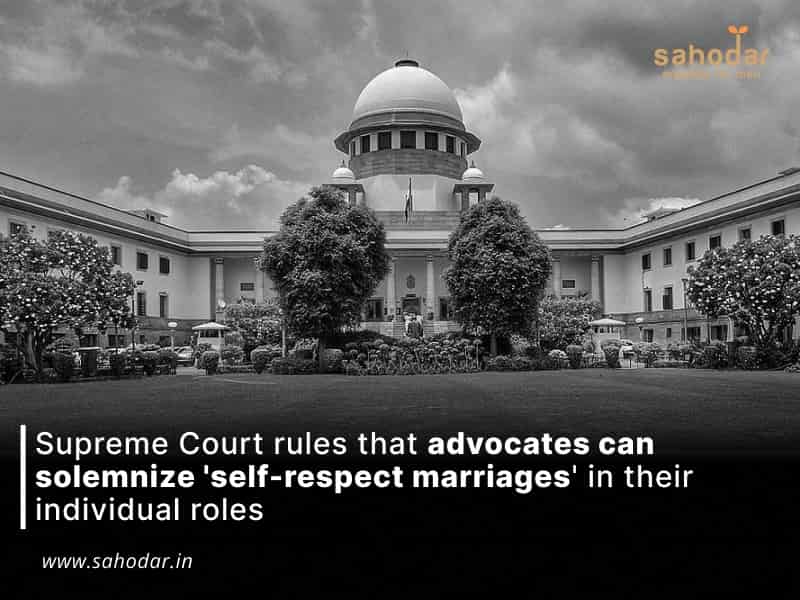The Court set aside a recent Madras High Court ruling which had held that lawyers cannot preside over such marriages in their offices or trade union offices and then issue marriage certificates.
The Supreme Court noted on Monday that advocates are not universally prohibited from officiating self-respect marriages in their personal capacity according to Section 7(A) of the Hindu Marriage Act. This amendment, introduced by the Tamil Nadu government, clarifies the situation. [Ilavarsan v. The Superintendent of Police].
In 1968, Tamil Nadu legalized self-respect (Suyammariyathai) marriages, stipulating that both parties must provide consent and meet the minimum age requirement for marriage. This move aimed to eliminate the necessity for upper-caste priests and elaborate rituals during wedding ceremonies. Nonetheless, these marriages were still required to be officially registered.
A Bench composed of Justices S Ravindra Bhat and Aravind Kumar invalidated a recent judgment by the Madras High Court, which had determined that lawyers couldn’t oversee such marriages in their law offices or trade union premises and subsequently issue marriage certificates.
The Supreme Court clarified that lawyers, when acting in their personal capacity and not as officers of the court, can conduct marriages under Section 7(A) of the Hindu Marriage Act. This decision effectively permits self-respect marriages to continue occurring in advocates’ offices in Tamil Nadu.
Significantly, the Bench also overturned the Madras High Court’s 2014 ruling in S Balakrishnan Pandian case, where it had been established that marriages performed by lawyers are not valid and that even self-respect marriages need to be conducted publicly.
In May of this year, the Madras High Court instructed the Tamil Nadu State Bar Council to commence disciplinary actions against lawyers who oversee confidential marriages in their law offices or trade union premises.
The High Court had observed that all marriages, including those performed under the ‘self respect’ provision must be “registered under the Tamil Nadu Registration of Marriages Act, 2009 and the parties must physically appear before the Registrar.”
The aforementioned directive was issued subsequent to the filing of a habeas corpus petition by an individual named Ilavarasan. He asserted that his spouse had been involuntarily confined by her parents, despite their marriage being officiated by advocates and trade union representatives in accordance with Section 7(A) of the Hindu Marriage Act.
The petitioner also highlighted that the advocates had issued the couple a marriage certificate for the self-respect marriage.
The High Court declared the marriage null and void, prompting the current appeal presented to the Supreme Court.
Earlier in the current month, the Supreme Court had directed the Ramanathapuram District Legal Services Authority to record a statement from the wife. This was done to determine whether she was under any coercion to reside with anyone.
The report confirmed that she was currently compelled to live with her parents, who had attempted to marry her off forcefully when she was just 16. It was also stated that she desired to live with Ilavarasan.
Consequently, the Supreme Court granted approval to the habeas corpus petition submitted by Ilavarasan.
Ilavarasan was legally represented by Advocates A Velan and Mrityunjay Pathak.
Source : https://www.barandbench.com/news/advocates-self-respect-marriages-personal-capacity-tamil-nadu-supreme-court

